Karl Marx: Exploring Historical Materialism and Class Struggle
VerifiedAdded on 2022/11/13
|9
|1864
|237
Essay
AI Summary
This essay delves into the life and contributions of Karl Marx, a pivotal figure in history. It explores his Marxist theory, focusing on historical materialism and the concept of class struggle as key tools for understanding social, political, and economic dynamics, particularly in the 19th century. The essay outlines Marx's analysis of historical events, emphasizing the role of material conditions and economic relationships in shaping society. It examines how Marx viewed history as a conflict between oppressors and the oppressed, highlighting the class struggle between the bourgeoisie and the proletariat. The essay also discusses the evolution of capitalism and its impact on workers, as analyzed by Marx. The conclusion emphasizes the enduring relevance of Marx's ideas and their impact on historical inquiry and the development of social and economic theories.
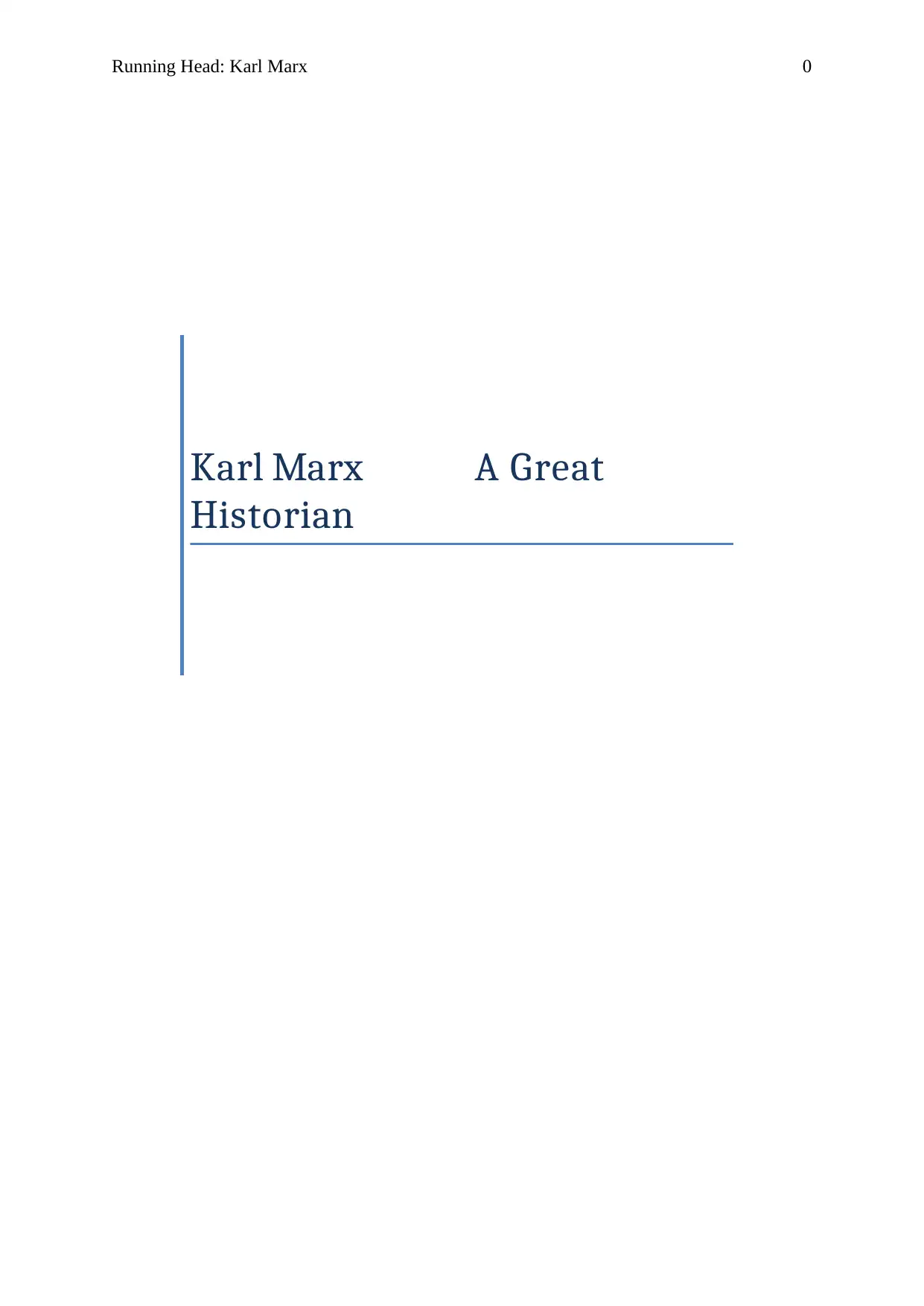
Running Head: Karl Marx 0
Karl Marx A Great
Historian
Karl Marx A Great
Historian
Paraphrase This Document
Need a fresh take? Get an instant paraphrase of this document with our AI Paraphraser
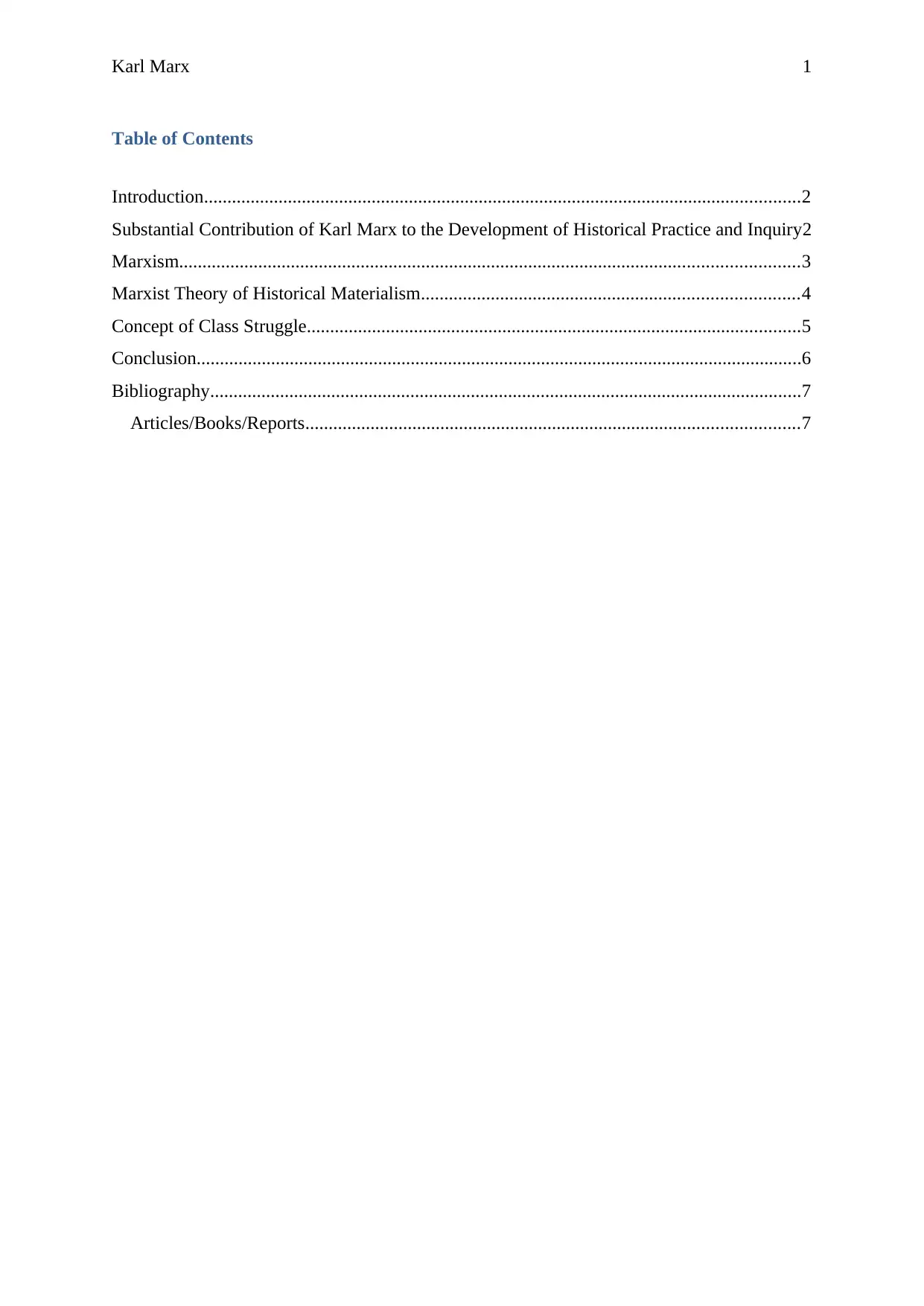
Karl Marx 1
Table of Contents
Introduction................................................................................................................................2
Substantial Contribution of Karl Marx to the Development of Historical Practice and Inquiry2
Marxism.....................................................................................................................................3
Marxist Theory of Historical Materialism.................................................................................4
Concept of Class Struggle..........................................................................................................5
Conclusion..................................................................................................................................6
Bibliography...............................................................................................................................7
Articles/Books/Reports..........................................................................................................7
Table of Contents
Introduction................................................................................................................................2
Substantial Contribution of Karl Marx to the Development of Historical Practice and Inquiry2
Marxism.....................................................................................................................................3
Marxist Theory of Historical Materialism.................................................................................4
Concept of Class Struggle..........................................................................................................5
Conclusion..................................................................................................................................6
Bibliography...............................................................................................................................7
Articles/Books/Reports..........................................................................................................7
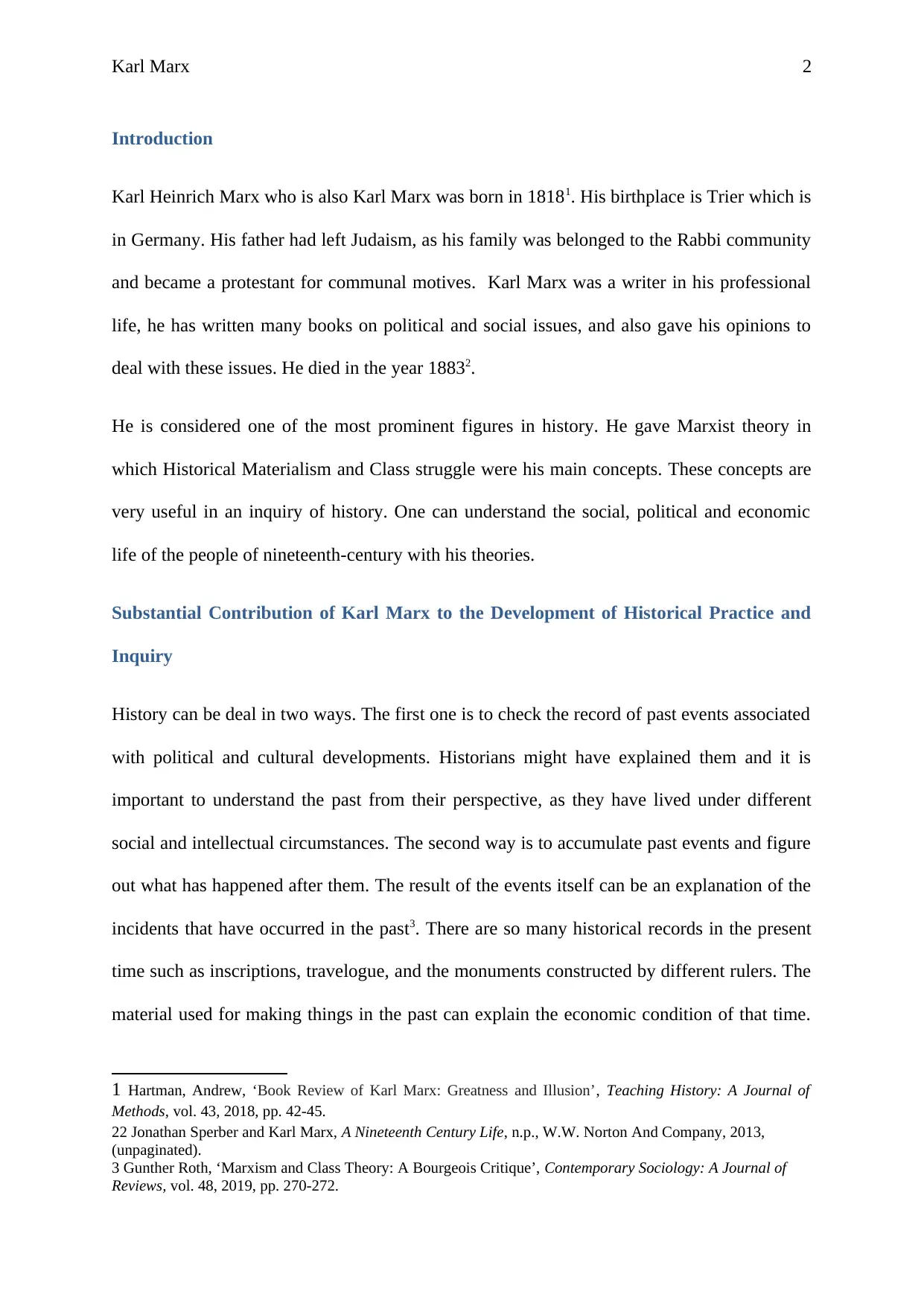
Karl Marx 2
Introduction
Karl Heinrich Marx who is also Karl Marx was born in 18181. His birthplace is Trier which is
in Germany. His father had left Judaism, as his family was belonged to the Rabbi community
and became a protestant for communal motives. Karl Marx was a writer in his professional
life, he has written many books on political and social issues, and also gave his opinions to
deal with these issues. He died in the year 18832.
He is considered one of the most prominent figures in history. He gave Marxist theory in
which Historical Materialism and Class struggle were his main concepts. These concepts are
very useful in an inquiry of history. One can understand the social, political and economic
life of the people of nineteenth-century with his theories.
Substantial Contribution of Karl Marx to the Development of Historical Practice and
Inquiry
History can be deal in two ways. The first one is to check the record of past events associated
with political and cultural developments. Historians might have explained them and it is
important to understand the past from their perspective, as they have lived under different
social and intellectual circumstances. The second way is to accumulate past events and figure
out what has happened after them. The result of the events itself can be an explanation of the
incidents that have occurred in the past3. There are so many historical records in the present
time such as inscriptions, travelogue, and the monuments constructed by different rulers. The
material used for making things in the past can explain the economic condition of that time.
1 Hartman, Andrew, ‘Book Review of Karl Marx: Greatness and Illusion’, Teaching History: A Journal of
Methods, vol. 43, 2018, pp. 42-45.
22 Jonathan Sperber and Karl Marx, A Nineteenth Century Life, n.p., W.W. Norton And Company, 2013,
(unpaginated).
3 Gunther Roth, ‘Marxism and Class Theory: A Bourgeois Critique’, Contemporary Sociology: A Journal of
Reviews, vol. 48, 2019, pp. 270-272.
Introduction
Karl Heinrich Marx who is also Karl Marx was born in 18181. His birthplace is Trier which is
in Germany. His father had left Judaism, as his family was belonged to the Rabbi community
and became a protestant for communal motives. Karl Marx was a writer in his professional
life, he has written many books on political and social issues, and also gave his opinions to
deal with these issues. He died in the year 18832.
He is considered one of the most prominent figures in history. He gave Marxist theory in
which Historical Materialism and Class struggle were his main concepts. These concepts are
very useful in an inquiry of history. One can understand the social, political and economic
life of the people of nineteenth-century with his theories.
Substantial Contribution of Karl Marx to the Development of Historical Practice and
Inquiry
History can be deal in two ways. The first one is to check the record of past events associated
with political and cultural developments. Historians might have explained them and it is
important to understand the past from their perspective, as they have lived under different
social and intellectual circumstances. The second way is to accumulate past events and figure
out what has happened after them. The result of the events itself can be an explanation of the
incidents that have occurred in the past3. There are so many historical records in the present
time such as inscriptions, travelogue, and the monuments constructed by different rulers. The
material used for making things in the past can explain the economic condition of that time.
1 Hartman, Andrew, ‘Book Review of Karl Marx: Greatness and Illusion’, Teaching History: A Journal of
Methods, vol. 43, 2018, pp. 42-45.
22 Jonathan Sperber and Karl Marx, A Nineteenth Century Life, n.p., W.W. Norton And Company, 2013,
(unpaginated).
3 Gunther Roth, ‘Marxism and Class Theory: A Bourgeois Critique’, Contemporary Sociology: A Journal of
Reviews, vol. 48, 2019, pp. 270-272.
⊘ This is a preview!⊘
Do you want full access?
Subscribe today to unlock all pages.

Trusted by 1+ million students worldwide
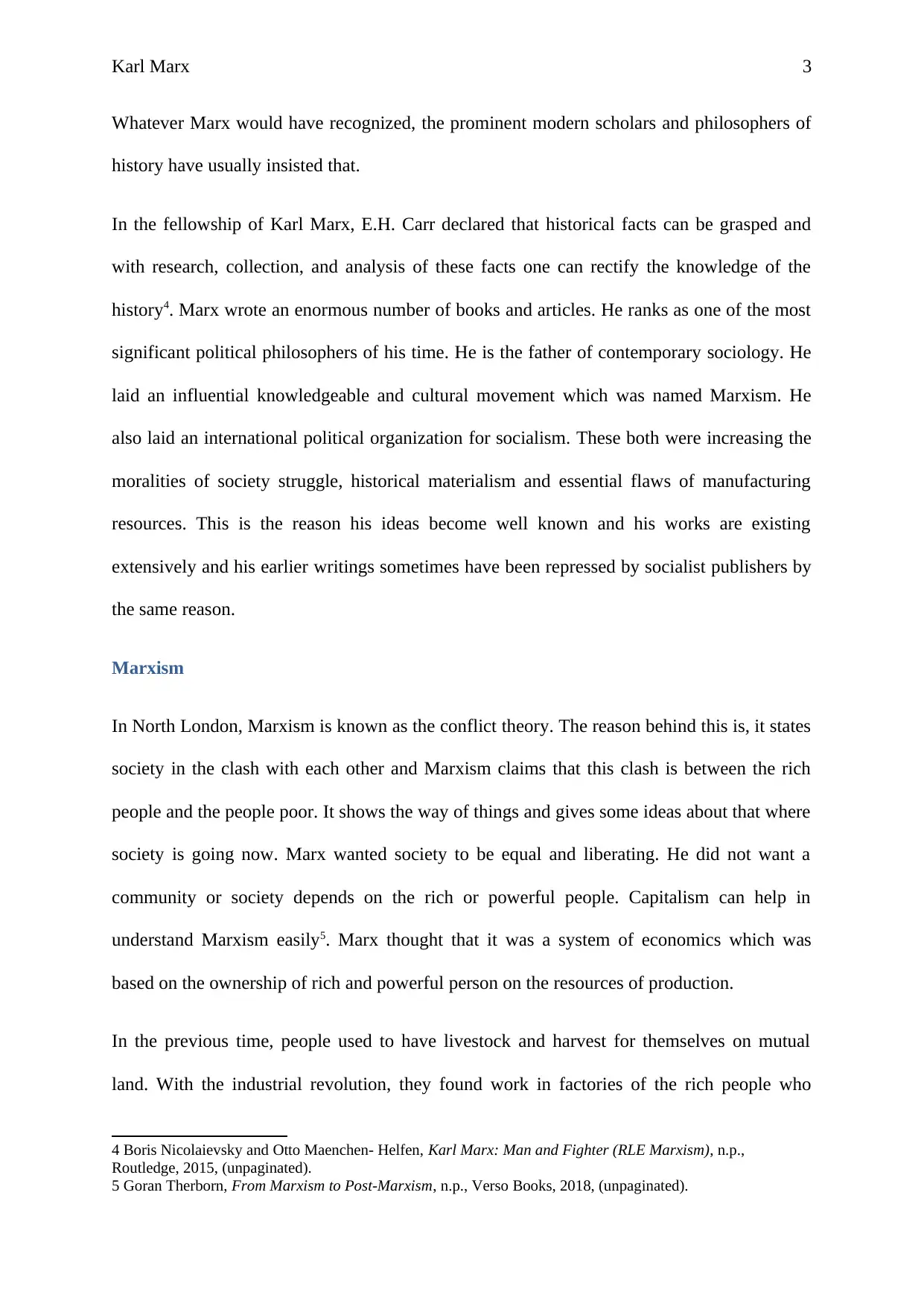
Karl Marx 3
Whatever Marx would have recognized, the prominent modern scholars and philosophers of
history have usually insisted that.
In the fellowship of Karl Marx, E.H. Carr declared that historical facts can be grasped and
with research, collection, and analysis of these facts one can rectify the knowledge of the
history4. Marx wrote an enormous number of books and articles. He ranks as one of the most
significant political philosophers of his time. He is the father of contemporary sociology. He
laid an influential knowledgeable and cultural movement which was named Marxism. He
also laid an international political organization for socialism. These both were increasing the
moralities of society struggle, historical materialism and essential flaws of manufacturing
resources. This is the reason his ideas become well known and his works are existing
extensively and his earlier writings sometimes have been repressed by socialist publishers by
the same reason.
Marxism
In North London, Marxism is known as the conflict theory. The reason behind this is, it states
society in the clash with each other and Marxism claims that this clash is between the rich
people and the people poor. It shows the way of things and gives some ideas about that where
society is going now. Marx wanted society to be equal and liberating. He did not want a
community or society depends on the rich or powerful people. Capitalism can help in
understand Marxism easily5. Marx thought that it was a system of economics which was
based on the ownership of rich and powerful person on the resources of production.
In the previous time, people used to have livestock and harvest for themselves on mutual
land. With the industrial revolution, they found work in factories of the rich people who
4 Boris Nicolaievsky and Otto Maenchen- Helfen, Karl Marx: Man and Fighter (RLE Marxism), n.p.,
Routledge, 2015, (unpaginated).
5 Goran Therborn, From Marxism to Post-Marxism, n.p., Verso Books, 2018, (unpaginated).
Whatever Marx would have recognized, the prominent modern scholars and philosophers of
history have usually insisted that.
In the fellowship of Karl Marx, E.H. Carr declared that historical facts can be grasped and
with research, collection, and analysis of these facts one can rectify the knowledge of the
history4. Marx wrote an enormous number of books and articles. He ranks as one of the most
significant political philosophers of his time. He is the father of contemporary sociology. He
laid an influential knowledgeable and cultural movement which was named Marxism. He
also laid an international political organization for socialism. These both were increasing the
moralities of society struggle, historical materialism and essential flaws of manufacturing
resources. This is the reason his ideas become well known and his works are existing
extensively and his earlier writings sometimes have been repressed by socialist publishers by
the same reason.
Marxism
In North London, Marxism is known as the conflict theory. The reason behind this is, it states
society in the clash with each other and Marxism claims that this clash is between the rich
people and the people poor. It shows the way of things and gives some ideas about that where
society is going now. Marx wanted society to be equal and liberating. He did not want a
community or society depends on the rich or powerful people. Capitalism can help in
understand Marxism easily5. Marx thought that it was a system of economics which was
based on the ownership of rich and powerful person on the resources of production.
In the previous time, people used to have livestock and harvest for themselves on mutual
land. With the industrial revolution, they found work in factories of the rich people who
4 Boris Nicolaievsky and Otto Maenchen- Helfen, Karl Marx: Man and Fighter (RLE Marxism), n.p.,
Routledge, 2015, (unpaginated).
5 Goran Therborn, From Marxism to Post-Marxism, n.p., Verso Books, 2018, (unpaginated).
Paraphrase This Document
Need a fresh take? Get an instant paraphrase of this document with our AI Paraphraser
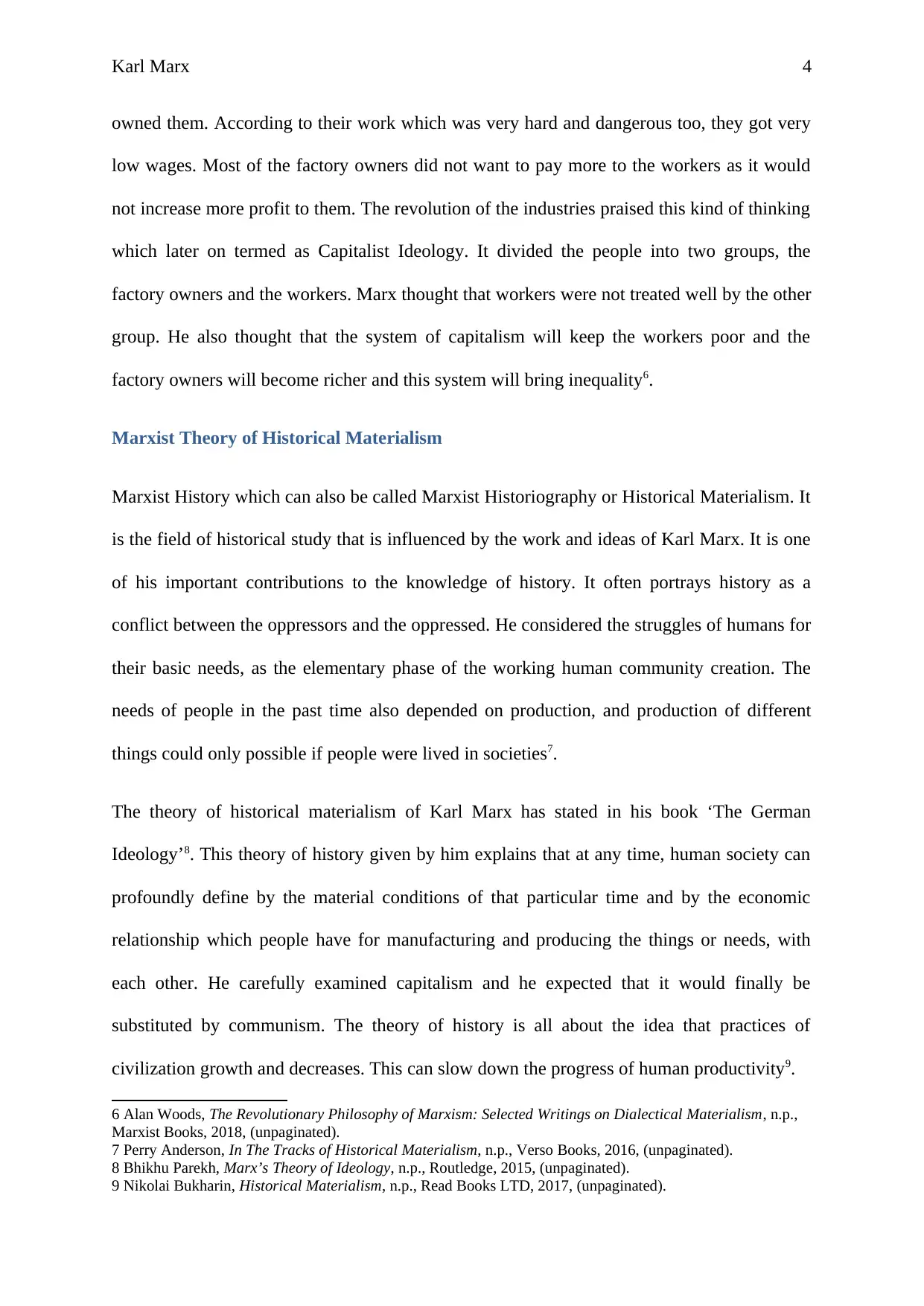
Karl Marx 4
owned them. According to their work which was very hard and dangerous too, they got very
low wages. Most of the factory owners did not want to pay more to the workers as it would
not increase more profit to them. The revolution of the industries praised this kind of thinking
which later on termed as Capitalist Ideology. It divided the people into two groups, the
factory owners and the workers. Marx thought that workers were not treated well by the other
group. He also thought that the system of capitalism will keep the workers poor and the
factory owners will become richer and this system will bring inequality6.
Marxist Theory of Historical Materialism
Marxist History which can also be called Marxist Historiography or Historical Materialism. It
is the field of historical study that is influenced by the work and ideas of Karl Marx. It is one
of his important contributions to the knowledge of history. It often portrays history as a
conflict between the oppressors and the oppressed. He considered the struggles of humans for
their basic needs, as the elementary phase of the working human community creation. The
needs of people in the past time also depended on production, and production of different
things could only possible if people were lived in societies7.
The theory of historical materialism of Karl Marx has stated in his book ‘The German
Ideology’8. This theory of history given by him explains that at any time, human society can
profoundly define by the material conditions of that particular time and by the economic
relationship which people have for manufacturing and producing the things or needs, with
each other. He carefully examined capitalism and he expected that it would finally be
substituted by communism. The theory of history is all about the idea that practices of
civilization growth and decreases. This can slow down the progress of human productivity9.
6 Alan Woods, The Revolutionary Philosophy of Marxism: Selected Writings on Dialectical Materialism, n.p.,
Marxist Books, 2018, (unpaginated).
7 Perry Anderson, In The Tracks of Historical Materialism, n.p., Verso Books, 2016, (unpaginated).
8 Bhikhu Parekh, Marx’s Theory of Ideology, n.p., Routledge, 2015, (unpaginated).
9 Nikolai Bukharin, Historical Materialism, n.p., Read Books LTD, 2017, (unpaginated).
owned them. According to their work which was very hard and dangerous too, they got very
low wages. Most of the factory owners did not want to pay more to the workers as it would
not increase more profit to them. The revolution of the industries praised this kind of thinking
which later on termed as Capitalist Ideology. It divided the people into two groups, the
factory owners and the workers. Marx thought that workers were not treated well by the other
group. He also thought that the system of capitalism will keep the workers poor and the
factory owners will become richer and this system will bring inequality6.
Marxist Theory of Historical Materialism
Marxist History which can also be called Marxist Historiography or Historical Materialism. It
is the field of historical study that is influenced by the work and ideas of Karl Marx. It is one
of his important contributions to the knowledge of history. It often portrays history as a
conflict between the oppressors and the oppressed. He considered the struggles of humans for
their basic needs, as the elementary phase of the working human community creation. The
needs of people in the past time also depended on production, and production of different
things could only possible if people were lived in societies7.
The theory of historical materialism of Karl Marx has stated in his book ‘The German
Ideology’8. This theory of history given by him explains that at any time, human society can
profoundly define by the material conditions of that particular time and by the economic
relationship which people have for manufacturing and producing the things or needs, with
each other. He carefully examined capitalism and he expected that it would finally be
substituted by communism. The theory of history is all about the idea that practices of
civilization growth and decreases. This can slow down the progress of human productivity9.
6 Alan Woods, The Revolutionary Philosophy of Marxism: Selected Writings on Dialectical Materialism, n.p.,
Marxist Books, 2018, (unpaginated).
7 Perry Anderson, In The Tracks of Historical Materialism, n.p., Verso Books, 2016, (unpaginated).
8 Bhikhu Parekh, Marx’s Theory of Ideology, n.p., Routledge, 2015, (unpaginated).
9 Nikolai Bukharin, Historical Materialism, n.p., Read Books LTD, 2017, (unpaginated).
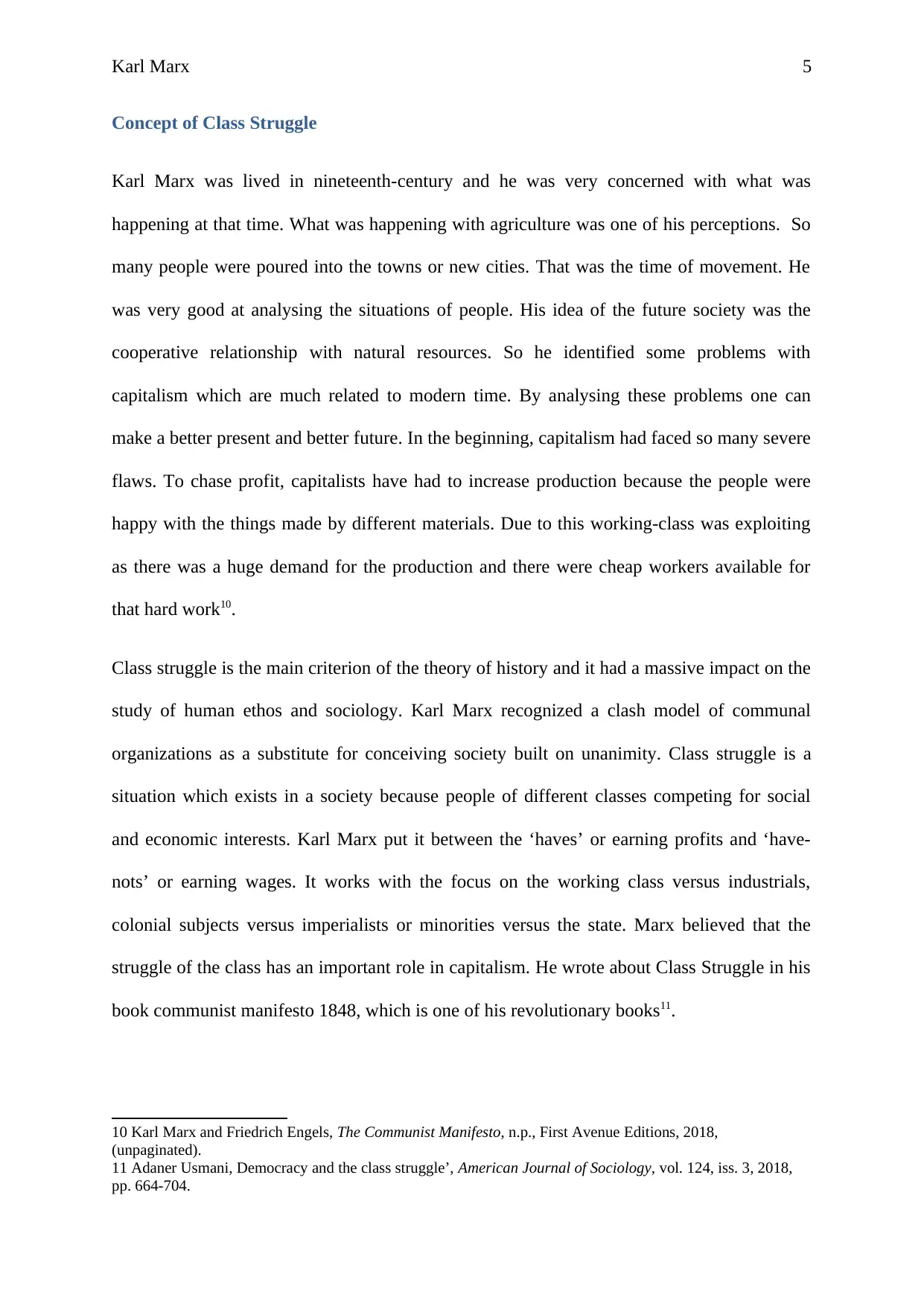
Karl Marx 5
Concept of Class Struggle
Karl Marx was lived in nineteenth-century and he was very concerned with what was
happening at that time. What was happening with agriculture was one of his perceptions. So
many people were poured into the towns or new cities. That was the time of movement. He
was very good at analysing the situations of people. His idea of the future society was the
cooperative relationship with natural resources. So he identified some problems with
capitalism which are much related to modern time. By analysing these problems one can
make a better present and better future. In the beginning, capitalism had faced so many severe
flaws. To chase profit, capitalists have had to increase production because the people were
happy with the things made by different materials. Due to this working-class was exploiting
as there was a huge demand for the production and there were cheap workers available for
that hard work10.
Class struggle is the main criterion of the theory of history and it had a massive impact on the
study of human ethos and sociology. Karl Marx recognized a clash model of communal
organizations as a substitute for conceiving society built on unanimity. Class struggle is a
situation which exists in a society because people of different classes competing for social
and economic interests. Karl Marx put it between the ‘haves’ or earning profits and ‘have-
nots’ or earning wages. It works with the focus on the working class versus industrials,
colonial subjects versus imperialists or minorities versus the state. Marx believed that the
struggle of the class has an important role in capitalism. He wrote about Class Struggle in his
book communist manifesto 1848, which is one of his revolutionary books11.
10 Karl Marx and Friedrich Engels, The Communist Manifesto, n.p., First Avenue Editions, 2018,
(unpaginated).
11 Adaner Usmani, Democracy and the class struggle’, American Journal of Sociology, vol. 124, iss. 3, 2018,
pp. 664-704.
Concept of Class Struggle
Karl Marx was lived in nineteenth-century and he was very concerned with what was
happening at that time. What was happening with agriculture was one of his perceptions. So
many people were poured into the towns or new cities. That was the time of movement. He
was very good at analysing the situations of people. His idea of the future society was the
cooperative relationship with natural resources. So he identified some problems with
capitalism which are much related to modern time. By analysing these problems one can
make a better present and better future. In the beginning, capitalism had faced so many severe
flaws. To chase profit, capitalists have had to increase production because the people were
happy with the things made by different materials. Due to this working-class was exploiting
as there was a huge demand for the production and there were cheap workers available for
that hard work10.
Class struggle is the main criterion of the theory of history and it had a massive impact on the
study of human ethos and sociology. Karl Marx recognized a clash model of communal
organizations as a substitute for conceiving society built on unanimity. Class struggle is a
situation which exists in a society because people of different classes competing for social
and economic interests. Karl Marx put it between the ‘haves’ or earning profits and ‘have-
nots’ or earning wages. It works with the focus on the working class versus industrials,
colonial subjects versus imperialists or minorities versus the state. Marx believed that the
struggle of the class has an important role in capitalism. He wrote about Class Struggle in his
book communist manifesto 1848, which is one of his revolutionary books11.
10 Karl Marx and Friedrich Engels, The Communist Manifesto, n.p., First Avenue Editions, 2018,
(unpaginated).
11 Adaner Usmani, Democracy and the class struggle’, American Journal of Sociology, vol. 124, iss. 3, 2018,
pp. 664-704.
⊘ This is a preview!⊘
Do you want full access?
Subscribe today to unlock all pages.

Trusted by 1+ million students worldwide
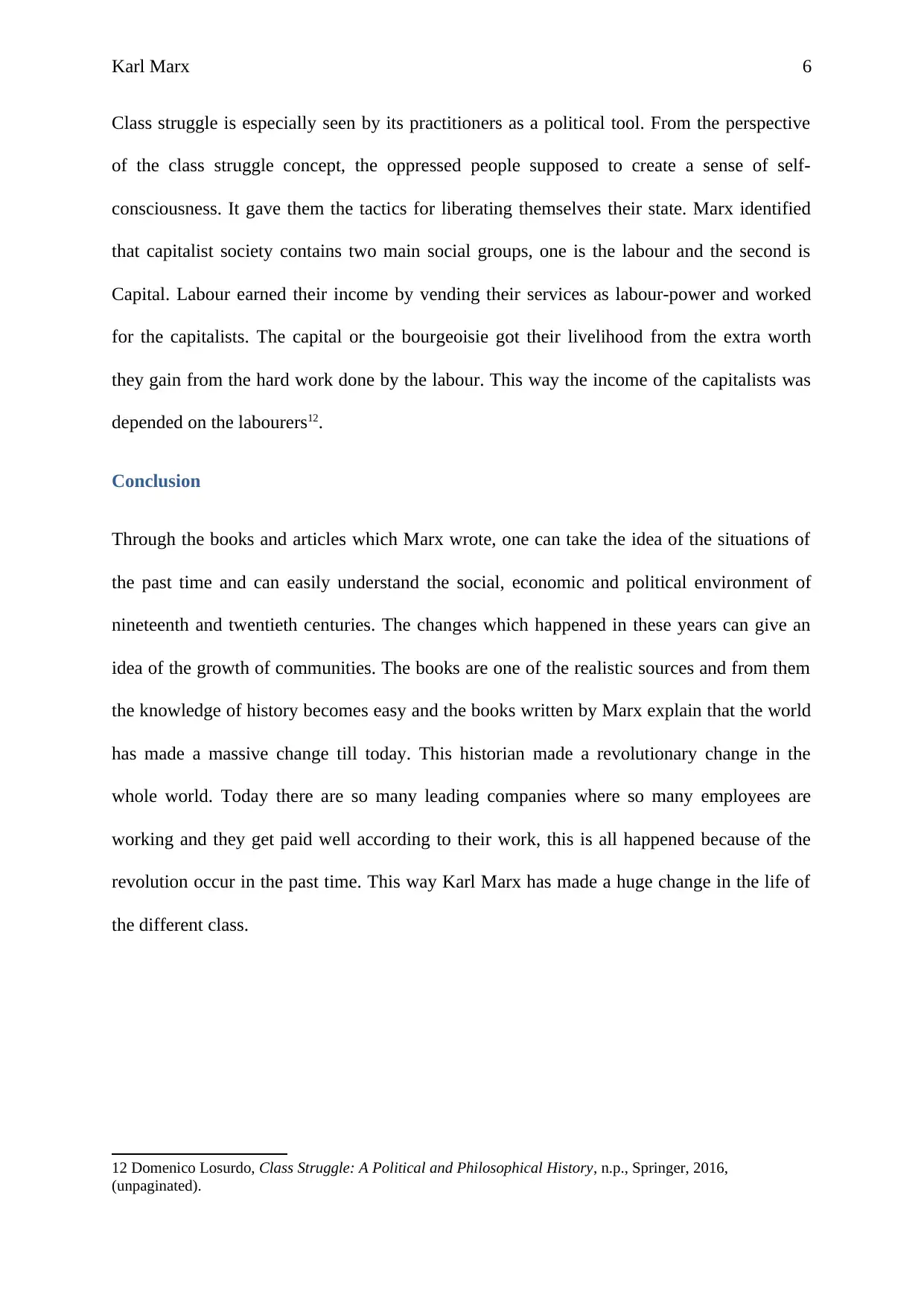
Karl Marx 6
Class struggle is especially seen by its practitioners as a political tool. From the perspective
of the class struggle concept, the oppressed people supposed to create a sense of self-
consciousness. It gave them the tactics for liberating themselves their state. Marx identified
that capitalist society contains two main social groups, one is the labour and the second is
Capital. Labour earned their income by vending their services as labour-power and worked
for the capitalists. The capital or the bourgeoisie got their livelihood from the extra worth
they gain from the hard work done by the labour. This way the income of the capitalists was
depended on the labourers12.
Conclusion
Through the books and articles which Marx wrote, one can take the idea of the situations of
the past time and can easily understand the social, economic and political environment of
nineteenth and twentieth centuries. The changes which happened in these years can give an
idea of the growth of communities. The books are one of the realistic sources and from them
the knowledge of history becomes easy and the books written by Marx explain that the world
has made a massive change till today. This historian made a revolutionary change in the
whole world. Today there are so many leading companies where so many employees are
working and they get paid well according to their work, this is all happened because of the
revolution occur in the past time. This way Karl Marx has made a huge change in the life of
the different class.
12 Domenico Losurdo, Class Struggle: A Political and Philosophical History, n.p., Springer, 2016,
(unpaginated).
Class struggle is especially seen by its practitioners as a political tool. From the perspective
of the class struggle concept, the oppressed people supposed to create a sense of self-
consciousness. It gave them the tactics for liberating themselves their state. Marx identified
that capitalist society contains two main social groups, one is the labour and the second is
Capital. Labour earned their income by vending their services as labour-power and worked
for the capitalists. The capital or the bourgeoisie got their livelihood from the extra worth
they gain from the hard work done by the labour. This way the income of the capitalists was
depended on the labourers12.
Conclusion
Through the books and articles which Marx wrote, one can take the idea of the situations of
the past time and can easily understand the social, economic and political environment of
nineteenth and twentieth centuries. The changes which happened in these years can give an
idea of the growth of communities. The books are one of the realistic sources and from them
the knowledge of history becomes easy and the books written by Marx explain that the world
has made a massive change till today. This historian made a revolutionary change in the
whole world. Today there are so many leading companies where so many employees are
working and they get paid well according to their work, this is all happened because of the
revolution occur in the past time. This way Karl Marx has made a huge change in the life of
the different class.
12 Domenico Losurdo, Class Struggle: A Political and Philosophical History, n.p., Springer, 2016,
(unpaginated).
Paraphrase This Document
Need a fresh take? Get an instant paraphrase of this document with our AI Paraphraser
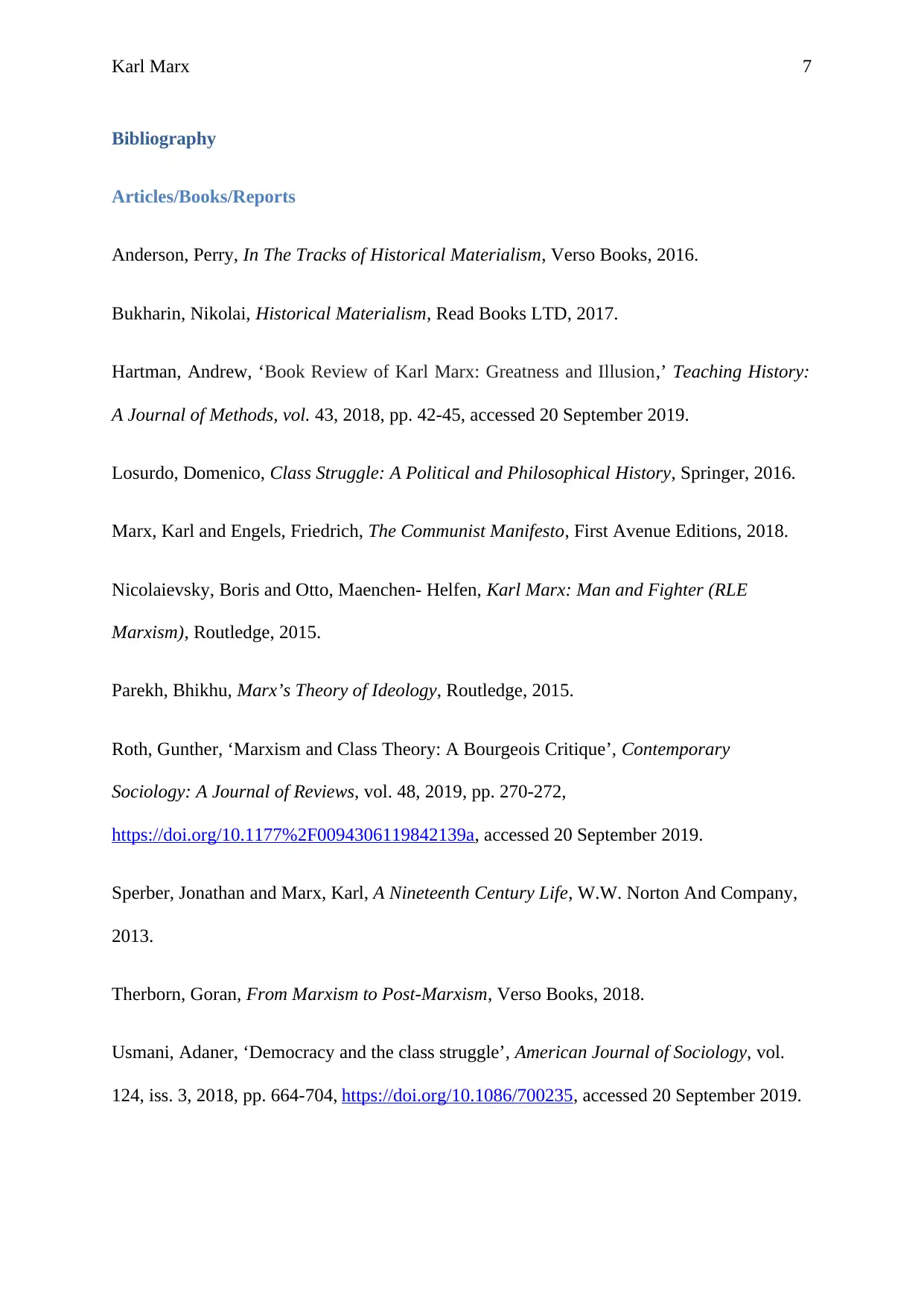
Karl Marx 7
Bibliography
Articles/Books/Reports
Anderson, Perry, In The Tracks of Historical Materialism, Verso Books, 2016.
Bukharin, Nikolai, Historical Materialism, Read Books LTD, 2017.
Hartman, Andrew, ‘Book Review of Karl Marx: Greatness and Illusion,’ Teaching History:
A Journal of Methods, vol. 43, 2018, pp. 42-45, accessed 20 September 2019.
Losurdo, Domenico, Class Struggle: A Political and Philosophical History, Springer, 2016.
Marx, Karl and Engels, Friedrich, The Communist Manifesto, First Avenue Editions, 2018.
Nicolaievsky, Boris and Otto, Maenchen- Helfen, Karl Marx: Man and Fighter (RLE
Marxism), Routledge, 2015.
Parekh, Bhikhu, Marx’s Theory of Ideology, Routledge, 2015.
Roth, Gunther, ‘Marxism and Class Theory: A Bourgeois Critique’, Contemporary
Sociology: A Journal of Reviews, vol. 48, 2019, pp. 270-272,
https://doi.org/10.1177%2F0094306119842139a, accessed 20 September 2019.
Sperber, Jonathan and Marx, Karl, A Nineteenth Century Life, W.W. Norton And Company,
2013.
Therborn, Goran, From Marxism to Post-Marxism, Verso Books, 2018.
Usmani, Adaner, ‘Democracy and the class struggle’, American Journal of Sociology, vol.
124, iss. 3, 2018, pp. 664-704, https://doi.org/10.1086/700235, accessed 20 September 2019.
Bibliography
Articles/Books/Reports
Anderson, Perry, In The Tracks of Historical Materialism, Verso Books, 2016.
Bukharin, Nikolai, Historical Materialism, Read Books LTD, 2017.
Hartman, Andrew, ‘Book Review of Karl Marx: Greatness and Illusion,’ Teaching History:
A Journal of Methods, vol. 43, 2018, pp. 42-45, accessed 20 September 2019.
Losurdo, Domenico, Class Struggle: A Political and Philosophical History, Springer, 2016.
Marx, Karl and Engels, Friedrich, The Communist Manifesto, First Avenue Editions, 2018.
Nicolaievsky, Boris and Otto, Maenchen- Helfen, Karl Marx: Man and Fighter (RLE
Marxism), Routledge, 2015.
Parekh, Bhikhu, Marx’s Theory of Ideology, Routledge, 2015.
Roth, Gunther, ‘Marxism and Class Theory: A Bourgeois Critique’, Contemporary
Sociology: A Journal of Reviews, vol. 48, 2019, pp. 270-272,
https://doi.org/10.1177%2F0094306119842139a, accessed 20 September 2019.
Sperber, Jonathan and Marx, Karl, A Nineteenth Century Life, W.W. Norton And Company,
2013.
Therborn, Goran, From Marxism to Post-Marxism, Verso Books, 2018.
Usmani, Adaner, ‘Democracy and the class struggle’, American Journal of Sociology, vol.
124, iss. 3, 2018, pp. 664-704, https://doi.org/10.1086/700235, accessed 20 September 2019.
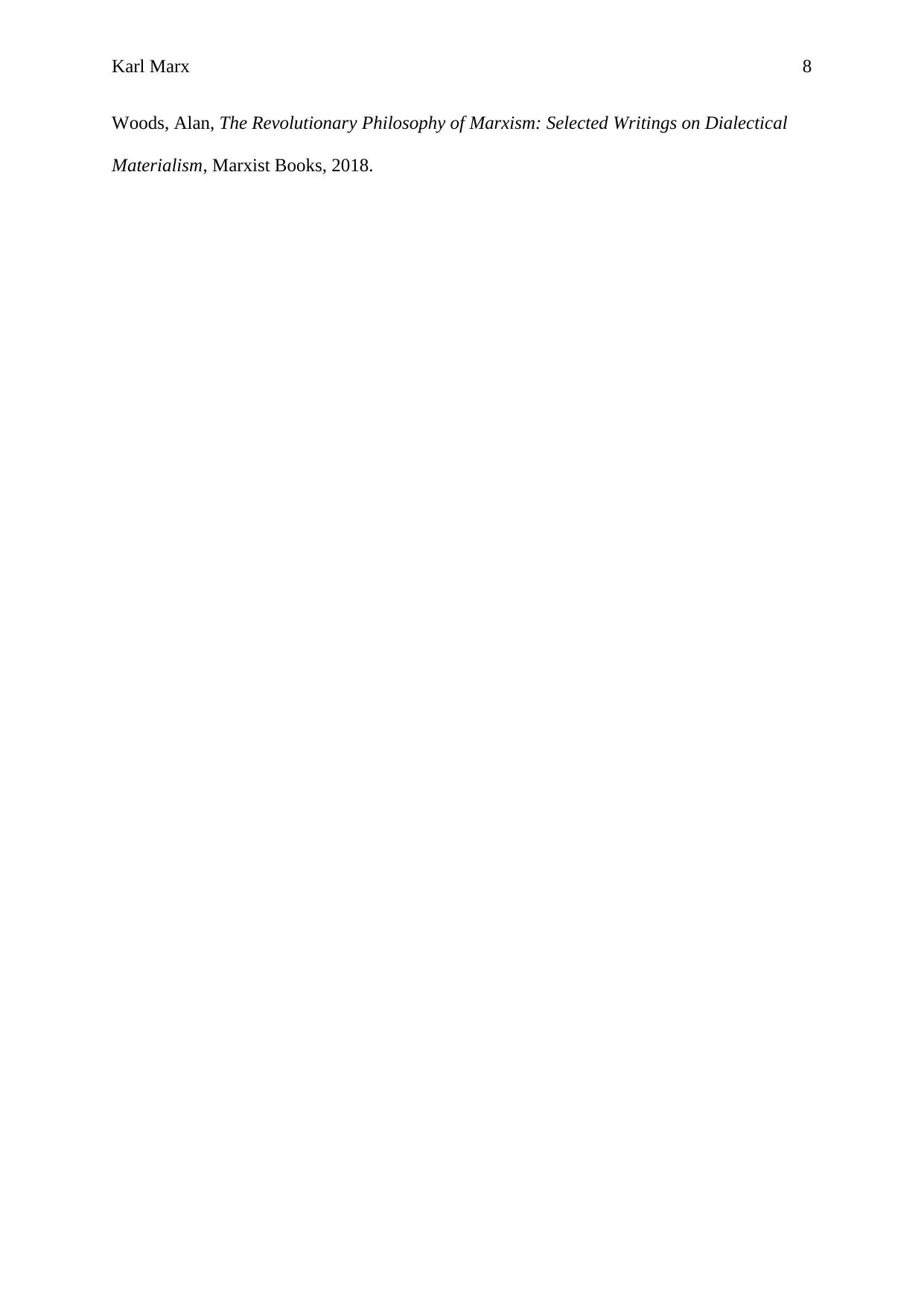
Karl Marx 8
Woods, Alan, The Revolutionary Philosophy of Marxism: Selected Writings on Dialectical
Materialism, Marxist Books, 2018.
Woods, Alan, The Revolutionary Philosophy of Marxism: Selected Writings on Dialectical
Materialism, Marxist Books, 2018.
⊘ This is a preview!⊘
Do you want full access?
Subscribe today to unlock all pages.

Trusted by 1+ million students worldwide
1 out of 9
Related Documents
Your All-in-One AI-Powered Toolkit for Academic Success.
+13062052269
info@desklib.com
Available 24*7 on WhatsApp / Email
![[object Object]](/_next/static/media/star-bottom.7253800d.svg)
Unlock your academic potential
Copyright © 2020–2026 A2Z Services. All Rights Reserved. Developed and managed by ZUCOL.



